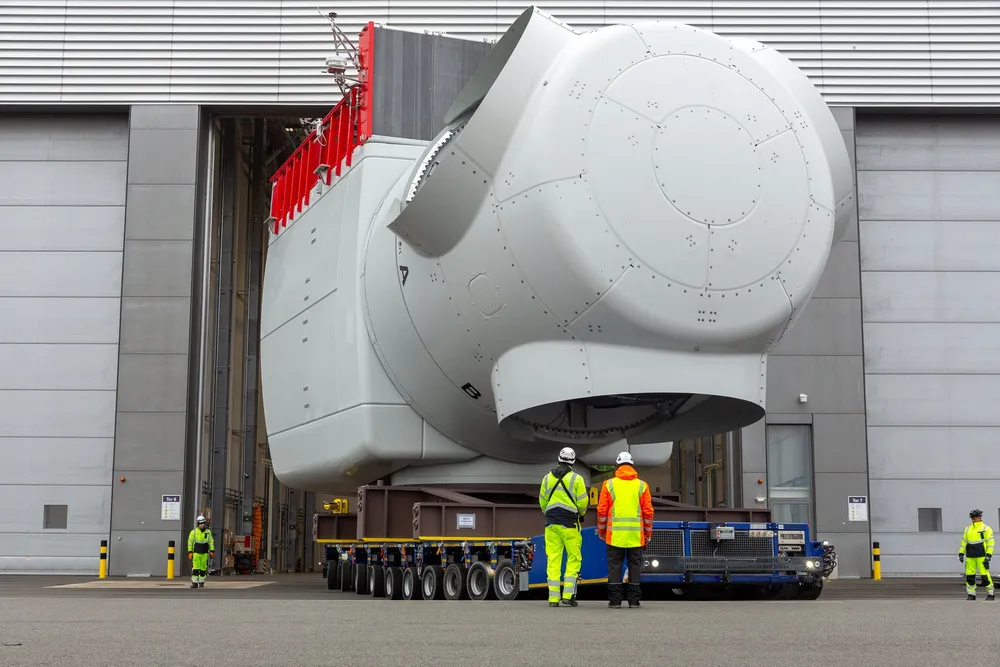US extends 50% steel tariff to wind turbines and components
Commerce department announces that sectoral tariff will also be slapped on steel and aluminium content of hundreds of derivative product categories

The US department of commerce has extended its 'derivative' sectoral tariffs to wind turbines and their parts and components, along with 406 other product categories.
As a result, the steel and aluminium content of these products will be subject to a duty rate of 50%.
The action also covers mobile cranes, bulldozers and other heavy equipment, which may also be used during the construction of wind farms.
Under-secretary of commerce for industry and security Jeffrey Kessler said the measure would “shut down avenues for circumvention” of the steel and aluminium tariffs already in place.
The extended tariffs take effect immediately.
While European wind OEMs such as Vestas and Nordex have production facilities for onshore wind turbines in the US, offshore wind turbines for the construction of the few wind projects off the US East Coast that have survived Trump's ire will need to be imported from Europe.
In 2024, the US wind industry imported $2.7bn of equipment, up 70% from the prior year, across three main product areas: blades and hubs (49%), towers (31%), and nacelles (19%), with the remaining one percent generator parts and sets.
The timing of the import influx coincided with work progress on three offshore wind projects, according to American Clean Power Association, a national trade group.
South Fork, which is now in commercial operation, Coastal Virginia Offshore Wind, the nation's largest at 2.6GW, and Revolution Wind - both under construction.
Given the limited domestic supply chain for offshore wind, it's not surprising that nacelles and towers experienced the most significant increase in imports, a trend expected to continue this year.
Germany, Spain, and Denmark were the three main suppliers for those items, while France also supplies blades for GE Vernova's Haliade-X turbines.
Stocks with exposure to the US offshore sector initially didn't react much to the news, possibly as investors had already been pricing in the idea that eventually the steel in wind turbines would be taxed just as much as steel itself.
Orsted stocks fell 1.07% to DKr28.57 per share at the Copenhagen Stock Exchange in early trading on Wednesday, while Vestas was actually up 0.11% to DKr135.15. Siemens Gamesa parent Siemens Energy fell 1.65% to €92.92 at the Frankfurt Stock Exchange.
Jacob Pedersen, chief stock analyst at Denmark's Sydbank said the tariff extension "firmed up evidence that we have another slap in the face of the wind industry".
The measure "will be an issue for offshore wind turbines being shipped to the US" such as Vestas turbines for Equinor's Empire Wind project.
"Orsted will feel this on their Sunrise project, as it will increase the price of importing turbines from Siemens Gamesa.
"To my knowledge, it is the developer that has the carry the cost for possible tariffs. This will make the Empire wind and Sunrise Wind projects much less profitable."
It was unclear, however, how the contract between Vestas and Equinor was structured to deal with a situation like this, Pedersen added.
Regarding Orsted, the analyst also said that the developer hadn't announced a write-down yet for the previous hike in US steel tariffs from 25 to 50%, which could add another €1.3bn to their costs.
US President Trump’s erratic tariff policies, as well as other hostile measures such as the phasing out of tax credits for wind and solar, have contributed to a heightened uncertainty in the renewables sector and jitters in green energy stocks.
Despite the anti-wind moves of the Trump administration, Vestas CEO Henrik Andersen last week said he didn’t expect many of his company’s US orders only to come in the next couple of years, but rather “leading towards the end of this decade”.